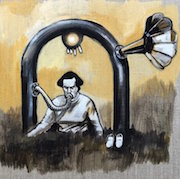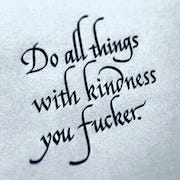|
Poutling posted:Just because a book is experimental it doesn't make it highbrow or else we'd be reading a lot of bizarro fiction about boogers and calling it high literature. Reminds me of this essay http://www.theatlantic.com/magazine/archive/2001/07/a-readers-manifesto/302270/ quote:More than half a century ago popular storytellers like Christopher Isherwood and Somerset Maugham were ranked among the finest novelists of their time, and were considered no less literary, in their own way, than Virginia Woolf and James Joyce. Today any accessible, fast-moving story written in unaffected prose is deemed to be "genre fiction"—at best an excellent "read" or a "page turner," but never literature with a capital L. An author with a track record of blockbusters may find the publication of a new work treated like a pop-culture event, but most "genre" novels are lucky to get an inch in the back pages of The New York Times Book Review.
|
|
|
|

|
| # ? Apr 23, 2024 21:41 |
|
How is that even real? How can you drool that many words onto a computer screen and go "Yes, this is Good" without wanting to give a blender a blowjob?
|
|
|
|
Literature doesn't always affect a distance, I would say it's at its best when it doesn't, as long as it avoids being sentimental.
|
|
|
|
Kellanved posted:A bit off topic, but I'm interested if there are any serious studies on the way literary criticism evolved within the broader cultural and philosophical movements of the time. A lot of the different critical movements were developed in order to see literature and art in a different light, and to analyse different aspects of a text. You could do a simple analysis of the structure and chronology, or you could dig deeper and try to get a feel for what social dynamic is inherent in the text, and how it pertains to the society at the time. It has less to do with confirming your beliefs and more to do with checking whether you were correct in the first place. Just as in "hard science", you seek out to find an answer to a question or a hypothesis.
|
|
|
|
Borneo Jimmy posted:Reminds me of this essay That essay is ridiculous, almost everything that is labeled "literary fiction" in America and England is extremely readable & not very experimental. The avant-garde tradition is alive but it is on the margins of literary culture, that is where you would find more experimental and daunting books.
|
|
|
|
Part of the problem here is that the border between "literary" and "non-literary" fiction is no longer under control of academics and is now fully maintained by publishers and booksellers, and this transitional period causes people to freak out and say all manner of stupid poo poo.
|
|
|
|
Blurred posted:Can we talk a little bit about why people are scared of / fail to properly appreciate literature? And how they might go about rectifying it? A much simpler answer to the first question is that the people who complain about books like Ulysses really don't think very hard about language, let alone appreciate the beauty of thoughtful language. And speaking of Ulysses, I want to throw it out there that the prose really isn't difficult (nor are Faulkner and Henry James, for that matter). The book probably isn't very fun if you're looking up all the minute references to people and events and hunting down the Homeric parallels in every chapter, but if you take the book by itself it's really fun and demonstrates the stupidity of the fun vs. literary debate. Also gently caress everyone who thinks it lacks emotion or characters to care about. Boatswain posted:That essay is ridiculous, almost everything that is labeled "literary fiction" in America and England is extremely readable & not very experimental. The avant-garde tradition is alive but it is on the margins of literary culture, that is where you would find more experimental and daunting books. There's a difference between experimentation and mystification; he knows better than to call writers like Paul Auster "daunting" or "intellectual." The essay gets tiresome when he defends writers like Stephen King, and in its lack of discussion of actual highbrow literature besides Anna Karenina, but the writing that he examines more closely really is terrible. All Nines fucked around with this message at 15:38 on Sep 17, 2014 |
|
|
|
Borneo Jimmy posted:Reminds me of this essay I think this sets up a view of literary fiction that is skewed. First of all, the concept of literary fiction in publishing is no less a genre or mode of writing than, say, fantasy, and on that I agree with the article. In my opinion though the distinction is about as useful as saying 'good books' and 'bad books' are a genre (possibly because it's a distinction mainly from publishers and not from academics, as far as I can see). Literary somehow carries connotations of deep and the moment you have a writer who writes in a 'literary fiction' mode but isn't saying anything particularly novel or interesting (cough Ian McEwan) what does that tell us about the genre? But in a lot of ways there is anxiety about 'boundary-pushing' (read: being difficult) that is wider than publishing circles. In Britain at least the world of 'literary fiction' is very bland and safe as far as I can see it, as Boatswain also mentioned above. Extreme caution on the part of publishers over here means that prize-winning books aren't really things worthy of great renown or brimming with experimental vigour, with a few exceptions, and yet people who read seem quite content with the way books are at the moment. Blurred's comment above really strikes home for me that there are a good chunk of people who aren't critical enough, or at least whose criticisms are too superficial. I might be entirely in the wrong here but it seems to me they're echoing what is really a majority view on what people consider to be good qualities in a novel. Who needs a reader's manifesto when readers show they want to stay within comfortable bounds – and they get what they want? Writers really need to say 'gently caress it, I'll be pretentious and self-indulgent if I want to be, thank you very much.' The written word excels when it pulls you up short, and comfort and safety don't deliver that. Art is a compromise anyway between artist and whoever's receiving it, and maybe the balance is off.
|
|
|
|
I will reveal my secret and say that I like Stephen king
|
|
|
|
The Gunslinger is Kind Of OK.
|
|
|
|
J_RBG posted:I think this sets up a view of literary fiction that is skewed. First of all, the concept of literary fiction in publishing is no less a genre or mode of writing than, say, fantasy, and on that I agree with the article. In my opinion though the distinction is about as useful as saying 'good books' and 'bad books' are a genre (possibly because it's a distinction mainly from publishers and not from academics, as far as I can see). Literary somehow carries connotations of deep and the moment you have a writer who writes in a 'literary fiction' mode but isn't saying anything particularly novel or interesting (cough Ian McEwan) what does that tell us about the genre? This is very well put, and I'll just add that trying to differentiate between "literary" or "non-literary" fiction is not just only useless but also dull (and apparently an endless task), literary fiction seems to me mostly a marketing ploy and a style (in the case of McEwan and his pals). It is much more interesting to discuss how and why a book moved you than to debate where to place it in a literary taxonomy.
|
|
|
|
The Unlife Aquatic posted:The Gunslinger is Kind Of OK. Yeah, I enjoyed The Gunslinger, but every subsequent entry into the series was worse and worse until you wondered why you even began and King pulls out the ultimate weak-rear end epilogues. His earlier stuff, when he was an alcoholic, are a lot more enjoyable than his later stuff, I find. I hate to say it, but being a "tortured artist" somehow makes your stuff more interesting to read. Also, his earlier stuff was edited--now he writes and writes and publishers just seem happy to be able to publish $50 800-page tomes.
|
|
|
|
Blind Sally posted:Yeah, I enjoyed The Gunslinger, but every subsequent entry into the series was worse and worse until you wondered why you even began and King pulls out the ultimate weak-rear end epilogues. That is kinda odd to hear. Stephen King is a huge proponent of the Second Draft = First Draft - 10% maxim, so it's kinda weird to see him fall into word bloat-age. But I guess that's an easy trap for anyone to fall into.
|
|
|
|
Was that from On Writing or an interview? On Writing was a solid read. But yeah, I'd call King a hyprocrite then because much of his work drags on long past its welcome, meandering places it doesn't need to be. Looking at his wikipedia page (http://en.wikipedia.org/wiki/Stephen_King_bibliography), his page count is all over the place--though having read a lot of his stuff when I was younger, I'm convinced most of it could stand to be trimmed, but that's just my opinion. The man just can't seem to stop writing. More power to him, though I thought he was retiring after Under The Dome, but he's got another 13 releases since then with another two pending.
|
|
|
|
Blind Sally posted:Was that from On Writing or an interview? On Writing was a solid read. Yeah it's from On Writing. He pretty much states that if there is any "one secret tip" that makes you a good writer, that's the one. He credits following it as the turning point in which he escaped form rejections and started getting personal ones and then eventually his first sales. That said, it's great advice. I just wonder why he doesn't follow it anymore. Or perhaps he does and we don't even want to know how large his first drafts were. As you said though, Kudos to him for doing what he loves. He's prob got enough money, he can do whatever he wants.
|
|
|
|
Chamberk posted:I did the same with Joyce Carol Oates's The Accursed, and it is also good. So I finished this the other day. I thought it was pretty good, but not to the degree that a lot of people have expressed. It's not bad at all, and I can appreciate some of what she's done there, but on the whole I was hoping for more. Not more pages, to be clear. Is there something I'm missing?
|
|
|
|
Ben Nevis posted:So I finished this the other day. I thought it was pretty good, but not to the degree that a lot of people have expressed. It's not bad at all, and I can appreciate some of what she's done there, but on the whole I was hoping for more. Not more pages, to be clear. Is there something I'm missing? It's a pretty polarizing book, people loved it or hated it so I don't think that there's anything you're 'missing' per se, maybe it just wasn't your cup of tea. I had a pretty good discussion with k-uno about the reasons we liked the book back on page 4 of the thread. I liked it for its originality - just such a weird, bombastic idea for a book and I think it's pretty amazing Oates was able to pull it off as well as she did without it coming across as ludicrous.
|
|
|
|
Speaking of essays, does anyone have a link to or remember any more details about an essay in which the author is highly critical of "writing the way writers write" and tears apart Cormac McCarthy, among others? All I can really remember is that the essay's author liked only The Orchard Keeper, and pointed out how stupid it is to pick out "favorite sentences" from books.
|
|
|
|
Wasn't that just posted at the top of this very page? http://www.theatlantic.com/magazine/archive/2001/07/a-readers-manifesto/302270/?single_page=true
|
|
|
|
That's embarrassing. I guess I glanced at that and didn't recognize it as the same website/page layout. I'm crawling into a hole to di enow haha
|
|
|
|
I tried reading The Divine Comedy once, but fully half the text was taken up by explanations. Explaining what particular research this author who compiled the volume did, backed by what institution, and this was what Florentine politics were like in Aligheri's day and oh yes this is the kind of coins they used and such and such peoples were persecuted thusly and here's how the church was involved and la-dee-dah more about the loving church and gee I bet you thought you'd actually get to reading the actual work at some point didn't you! I eventually gave up; it wasn't worth the effort.
|
|
|
|
Astrofig posted:I tried reading The Divine Comedy once, but fully half the text was taken up by explanations. Explaining what particular research this author who compiled the volume did, backed by what institution, and this was what Florentine politics were like in Aligheri's day and oh yes this is the kind of coins they used and such and such peoples were persecuted thusly and here's how the church was involved and la-dee-dah more about the loving church and gee I bet you thought you'd actually get to reading the actual work at some point didn't you! So what you're saying is that you wanted to read the book without even remotely understanding it? Significant parts of it are commentaries on medieval politics, both church and secular.
|
|
|
|
Also you can get an edition with less obtrusive annotations.
|
|
|
|
Ras Het posted:So what you're saying is that you wanted to read the book without even remotely understanding it? Significant parts of it are commentaries on medieval politics, both church and secular. I get that context is important, but is it really likely to diminish my enjoyment any not to know the exact rat-catching techniques employed by Florentines of his day? Or vitally important to understanding the literature to be aware of the debts this one particular businessman went into and why? It just....seemed like a bizarre level of detail; I just wanted to take in some well-crafted prose!
|
|
|
|
Astrofig posted:I get that context is important, but is it really likely to diminish my enjoyment any not to know the exact rat-catching techniques employed by Florentines of his day? Or vitally important to understanding the literature to be aware of the debts this one particular businessman went into and why? It just....seemed like a bizarre level of detail; I just wanted to take in some well-crafted prose! So why don't you just read a non-annotated version then if detailed annotations bother you so much?  Also, it's a poem. Not prose.
|
|
|
|
ARE there versions that don't have those? That's good to know. I'll look for one of those then.
|
|
|
|
Ras Het posted:So what you're saying is that you wanted to read the book without even remotely understanding it? Significant parts of it are commentaries on medieval politics, both church and secular.
|
|
|
|
Astrofig posted:ARE there versions that don't have those? That's good to know. I'll look for one of those then. Couldn't you just not read the annotations in the annotated copy you have?
|
|
|
|
Astrofig posted:ARE there versions that don't have those? That's good to know. I'll look for one of those then. Of course. Here you go: http://www.gutenberg.org/files/8799/8799-h/8799-h.htm#link1
|
|
|
|
Goddamn, I love me some obtrusive annotations, especially in translated books or works that are more than 100 years old. For ignorant sonsabitches like me, footnotes/endnotes can be a loving lifeline. edit: I done misspelled "sonsabitches" scourgeofthe7bees fucked around with this message at 16:55 on Sep 22, 2014 |
|
|
|
Borneo Jimmy posted:Reminds me of this essay Oh man, I remember this loser from when he ripped apart Tree of Smoke by Denis Johnson. I knew just from that article he'd be the type to hold up some ridiculously obscure, kitschy sub-genre as his ideal, and sure enough, he's into Australian crime fiction. Dude's a cliche.
|
|
|
|
On the topic of Dante — the poet Mary Jo Bang came out with a new translation just two years ago. It has annotations, but it's perfect if you don't care about all of the references to Italian politics etc. https://www.graywolfpress.org/books/inferno Personally, I love Dante's Inferno, and was ready to hate this new translation. But I didn't. It's a great interpretation of Dante's epic poem. But as others have said: it is NOT prose. Jack's Flow fucked around with this message at 19:41 on Sep 22, 2014 |
|
|
|
CestMoi posted:Couldn't you just not read the annotations in the annotated copy you have? Tried that---on my e-reader it actually took me about half an hour to scroll past. My wrist was beginning to hurt. Classic poetry should not be painful!
|
|
|
|
Poetry and e-readers are a bad combination anyway because most of the time the e-reader destroys the intended line breaks.
|
|
|
|
Astrofig posted:Tried that---on my e-reader it actually took me about half an hour to scroll past. My wrist was beginning to hurt. Classic poetry should not be painful! What kind of ereader do you have that doesn't allow you to go directly to a specific page
|
|
|
|
Poutling posted:It's a pretty polarizing book, people loved it or hated it so I don't think that there's anything you're 'missing' per se, maybe it just wasn't your cup of tea. I had a pretty good discussion with k-uno about the reasons we liked the book back on page 4 of the thread. I liked it for its originality - just such a weird, bombastic idea for a book and I think it's pretty amazing Oates was able to pull it off as well as she did without it coming across as ludicrous. I went back and read page 4 to see. On the whole, I did enjoy. I wouldn't say I loved it, and I'm not sure who I could actually recommend this book to. I wound up looking up a lot of stuff about Wilson and the other woman and Jack London (who apparently had some bat poo poo insane ideas about relationships) and some of the strikes and whatnot too. So from that perspective it was a success. My main problems, I think, stem mostly from the breadth. I'm not sure how it could have been tighter, and I understand that the meandering nature is sort of a hallmark of the Gothic novel format. It did get a bit much at times though. Despite seeming rather slow in parts, there were some good, tense, memorable scenes in there that I quite enjoyed.
|
|
|
|
I've been carving through The History of Tom Jones: A Foundling for close to a year now and I think I have finally hit the halfway mark. When I was unemployed and out of school I could have gotten through a book this size in a month or less (I devoured Proust), but now with all the other work and the reading I have to do for my history courses I'm lucky to sit down and read a few pages on the toilet. What I've noticed and find interesting, though, is that I seem to be retaining a lot more information. With a book that I really love and read really fast, I lose a lot of the details. David Copperfield, for example, had the exact formula that gets me absorbed in a book for days, but now when I think back on it, I have lost so much of it and I have to work to remember things. Tom Jones, meanwhile, I feel like I can easily recall pretty much the whole thing with little effort. It's kind of cool actually because it means that I can go back and read favourites over and over again. I think I have read (plebeian book alert) The Clan of the Cave Bear like five times.
|
|
|
|
I love crime films and novels but I'd really like to read some of the best classics of the genre. I'm currently reading Hamett's Red Harvest, can anyone recommend some good classic Noir or any sort of crime/mystery novels that aren't airport fiction level garbage?
|
|
|
|
OldTennisCourt posted:I love crime films and novels but I'd really like to read some of the best classics of the genre. I'm currently reading Hamett's Red Harvest, can anyone recommend some good classic Noir or any sort of crime/mystery novels that aren't airport fiction level garbage? yes, with the understanding that "classics" doesn't mean "have much literary merit" in this particular genre other good hammetts: the thin man the glass key the maltese falcon that one collection of continental op short stories raymond chandlers that are good: the big sleep farewell my lovely the long goodbye frederick nebel wrote a ton of short stories for black mask erle stanley gardner wrote a ton period but the most "noiry" stuff that isn't like perry mason are his lester leith stories of which there are like 70
|
|
|
|

|
| # ? Apr 23, 2024 21:41 |
|
Earwicker posted:What kind of ereader do you have that doesn't allow you to go directly to a specific page cheap old-model Kindle touch. Also Windows Phone app.
|
|
|




























